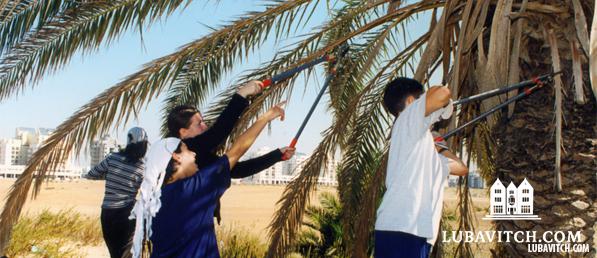(lubavitch.com) In Israel, honey jars fly off store shelves during the High Holiday season, when Jews pray for and wish each other a New Year filled with sweetness. Apples are dipped into the sticky stuff on Rosh Hashannah, and throughout the month of Tishrei Jewish people use honey instead of salt on their challah bread..
To keep up with the demand Yehuda Kandal, a beekeeper in Kfar Pines in northern Israel used to give a sugar rush to his beehives. “Sugar affects the taste of the honey, but I had no other option,“ Kandal said. Once summer blooms faded so did the attractive pollination sites near his 2500 hives. A sugar mixture kept Kandal’s bees going in the cooler months. Neighboring apiarists trucked their bees to southern Israel for the winter season, a labor intensive, expensive alternative.
But honey is just one of several agricultural product on shopping list this holiday season. To prepare for the festival of Sukkot, people are seeking out a variety of obscure produce: citron fruits and date palm, willow and myrtle branches, commonly referred to as the four kinds. The citron, or etrog, and the branches, lulav, are ripe with symbols that evoke the holiday‘s message of unity. Some interpretations link these to the body parts, which all work together in service of G-d. Others see the leaves and fruit as representing the different types of Jews, who, when joined together, can work toward a common greater mission.
Israel, a desert land, is a major supplier of these holiday essentials. Lubavitch.com hit the fields to find out how research is keeping those honey bears filled, the citrons bright and unblemished and the palm branches fresh.
David Brand, chief forester from the Keren Kayemet LeYisrael-Jewish National Fund, together with Dr. Dan Aizikovich, a researcher from Tel Aviv University and the Israel Honey Board have devoted their research to helping Israeli beekeepers produce ample quantities of honey without having to incur the expense of trucking or resort to the diminished quality of sugar feed. The two discovered certain Australian eucalyptus species that flower according to the southern hemisphere’s seasons even when they are transplanted. Their experiment is bearing fruit.
Kandal’s honey production is thriving through all seasons. His 60 eucalyptus trees bloom red, yellow and purple flowers across his 12 acre property. And they don’t require too much water, which may point to a sweeter future for Israel’s aspiring apiarists. “These species can grow in semi-arid conditions with less than 200 millimeters (7 inches) of rainfall per year,” Brand said. Beekeepers can now keep hives where it’s hot and dry, an economic boon for Israel’s desert dwellers.
Critical Care for Solar Shy Citrons
Heat, however, is citron farmer Nachum Luria’s worst enemy. On Kfar Chabad, near Lod, Israel, Luria oversees an orchard that produces thousands of etrogs, which are shipped worldwide for Sukkot. Fist sized and full of rippling nodules, the etrog is likened to the heart of the Jewish people. Like the heart that beats without ceasing, an etrog tree blooms all year through, keeping Luria and his fellow growers busy. Luria babies every bud: thorns are trimmed to keep them from piercing the fruit and branches that could mar the etrog’s surface are pruned.
Possessing an edible fruit center and a pleasant fragrance, an etrog is also compared to a person whose merits include both good deeds and Torah scholarship. The etrog is as precious – perfect specimens fetch prices into the hundreds of dollars – as it is fragile. Too much solar power scorches the fruit, so he covers each tree with a net to prevent sunburn.
The practice of obtaining a citron for Sukkot stems from Leviticus. “And you shall take unto yourselves on the first day [of Sukkot] a fruit of a beautiful tree.” Beauty, as defined by the Torah, is that which endures, not a fleeting fancy. After much discussion, the Talmud determines that the vague instruction refers to the citron, a fruit that grows throughout all seasons.
To raise citrons that meet the highest halachic standards requires constant vigilance. At Kfar Chabad, each fruit is bathed when it is picked to prevent spoilage. “It’s a very risky business,” said Luria. Eighty percent of his yield will not be Sukkot worthy.
If your personal etrog looks a little too green for your taste, here’s a tip from Luria. Never ripen them in the sun. Try storing them in a bag of apples instead. They are a natural source of ethylene gas, but watch for over-ripening.
Long Live the Lulav
The challenge of maintaining the freshness of the lulav has kept Israel’s agri-scientists busy for a decade. A lulav is a closed frond of a date palm. The lulav evokes the heady sweetness of dates but has no scent of its own. It symbolizes a scholar who knows Torah backwards and forwards but doesn‘t act upon that knowledge. Slender and about as long as a baseball bat, the lulav also represents the spine, the backbone of Divine Service.
Demand for the lulav exceeds 500,000 in Israel alone, according to industry estimates. Until recently, date palm growers had a two month window to harvest a maximum of five to six lulav branches per tree that would remain fresh for the holiday.
The Agricultural Research Institute and Northern Research Station of KKL-JNF developed a recipe for harvesting, wrapping, cooling and storing the lulav that’s allowing growers to preserve the branches for up to six months.
“We are producing two times more than before,” said Avner Rotem, palm tree manager at Tirat Zvi, a kibbutz in Beit Shean. Tirat Zvi manages 18,000 date trees, two of the nine species grown on the kibbutz are favored by lulav buyers.
Science, often thought to be at odds with religion, is helping Jewish practice from the roots up, especially during the High Holiday season.

Be the first to write a comment.